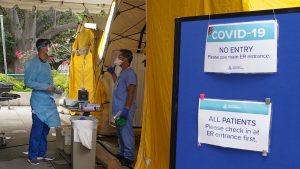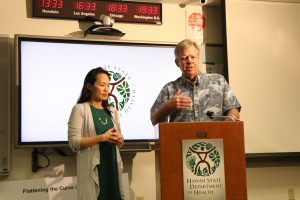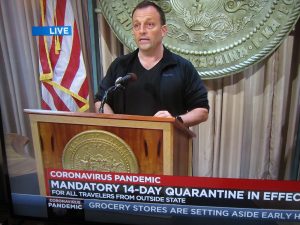State, counties on high alert as residents hunker down
Posted on Mar 28, 2020 in Capitol Connection, FeaturedHawai‘i has dealt with hurricanes, floods and volcanic eruptions, but a global pandemic? “We need to come together as a community to fight this virus,” said Governor Ige. In his second supplementary emergency proclamation, the governor mandated 14-day quarantines for both residents and visitors arriving or returning to Hawai‘i as well as for those traveling inter-island. “We want this action to send the message to visitors that we appreciate their love for Hawai‘i, but we are asking them to postpone their visit,” he said. To reinforce the message of community solidarity, the governor was flanked at the March 21 news conference by tourism and union leaders and state and county officials.
Those who break quarantine would face a $5,000 fine, or imprisonment of not more than one year, or both. Enforcement is being handled by each of Hawai‘i’s four counties. The quarantine, which is in effect until April 30, 2020, would apply to international and mainland flights. All arriving visitors and residents are required to complete a Hawai‘i Department of Agriculture form distributed onboard their flight. Upon arrival, they will go through a checkpoint and present the completed form with a valid identification. More details for inter-island travelers are pending.
The governor also issued a sweeping statewide “stay at home” order, except for essential activities, effective through April 30. (See details at https://bit:ly/2Uskxj0). “If everyone commits to doing their part, then we will be successful in bending the curve,” said the governor. This order was in addition to the Department of Education’s temporary closing of the state’s public schools, public libraries, parks and other facilities, the suspension of the current Legislative session, Neighborhood Board meetings and large public gatherings on all islands. It also follows a supplementary proclamation that specifically addressed the problem of residents hoarding supplies and urged the public to report instances of price gouging to the Department of Commerce and Consumer Affairs.
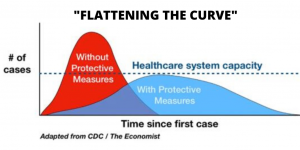
If there’s any good news amidst all of this, it’s that the islands have decades of experience in disaster preparedness and response. For COVID-19, it’s “all hands on deck” in ways Hawai‘i and the world have never dealt with before — from state, county and federal agencies to healthcare, business, nonprofit and community partners across the islands. The state Department of Health has been working around the clock to provide daily media updates to keep the public informed on local COVID-19 cases, expert advice and state mandates, and guidance from the Centers for Disease Control.
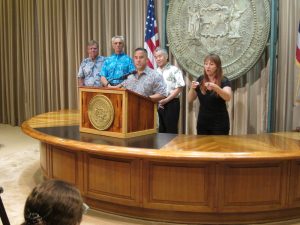
HI-EMA director Kenneth S. Hara, Hilton Raethel, CEO of the Healthcare Association of Hawaii, and DOH Director Bruce Anderson with the Governor.
The governor has appointed Kenneth S. Hara, director of HI-EMA, as “incident commander” of Hawai‘i’s coronavirus response, working closely with Health director Bruce Anderson, state epidemiologist Sarah Park, the state Department of Transportation, and the Federal Emergency Management Agency (FEMA). Hara said planning is under way with the National Guard and other state departments to identify the most effective ways to control the spread of the virus, protect communities, and maintain supplies for the islands. Hilton Raethel, president and CEO of the Healthcare Association of Hawaii (HAH), said he has been working with Lt. Gov. Josh Green’s COVID Task Force on testing sites and ensuring the medical community’s readiness. Officials are reminding people to help “flatten the curve” to avoid a spike in cases at a time when we have to conserve healthcare resources. “Everyone needs to take responsibility to avoid infection,” said DOH director Bruce Anderson. “That means social distancing and understanding that not everyone needs to be tested.”
